Introduction
The evolution of Azure Integration Services is a testament to Microsoft's commitment to developing a robust platform for connecting applications, systems, and data sources. Building on the foundation of earlier technologies like BizTalk Server, Azure Integration Services now stands as a comprehensive solution for seamless integration. Synchronizing data in real-time is crucial for modern businesses, as it enhances data consistency, fosters collaboration, and supports better decision-making.
Acknowledged by industry experts, including a 2024 Gartner Magic Quadrant report, Microsoft has been recognized as a leader in the Integration Platform as a Service sector. This recognition underscores the capabilities of Azure Integration Services to meet complex integration needs while maintaining a focus on customer satisfaction and innovation.
History of Azure Integration Services
The evolution of Azure Integration Services is a testament to Microsoft's commitment to developing a robust platform for connecting applications, systems, and data sources. Building on the foundation of earlier technologies like BizTalk Server, Azure Integration Services now stands as a comprehensive solution for seamless integration. Synchronizing data in real-time is crucial for modern businesses, as it enhances data consistency, fosters collaboration, and supports better decision-making. Acknowledged by industry experts, including a 2024 Gartner Magic Quadrant report, Microsoft has been recognized as a leader in the Integration Platform as a Service sector. This recognition underscores the capabilities of Azure Integration Services to meet complex integration needs while maintaining a focus on customer satisfaction and innovation.

Core Components of Azure Integration Services
Azure Integration Services provides a suite of components that collectively enable robust integration solutions, ensuring data consistency and facilitating collaboration between systems. By leveraging Azure Logic Apps, businesses can automate workflows and integrate apps, data, and services across enterprises or organizations. Azure Service Bus offers reliable message delivery in a decoupled environment, allowing for secure messaging and complex communications between distributed applications. API Management serves as the front door to applications, providing a centralized approach to API access, policy enforcement, and usage analytics.
Further enhancing the integration capabilities, Azure Event Grid and Event Hub are essential for event-driven architectures, processing large amounts of event data with ease and providing real-time data ingestion and event distribution. Azure Functions supports event-driven execution of code snippets, enabling you to run small pieces of code in response to various events. For data integration, Azure Data Factory allows for orchestrating and automating data movement and transformation.
To support complex integrations, Integration Accounts offer a way to manage artifacts like schemas and maps, while Hybrid Connections facilitate the integration of on-premises applications with Azure services. These components not only improve operational efficiency but also provide a foundation for better decision-making through access to real-time data.
Additionally, Microsoft's commitment to security is paramount, with over 3,500 security experts and an annual investment exceeding $1 billion in cybersecurity R&D. This commitment ensures that Azure Integration Services are not only powerful but also secure, providing peace of mind for businesses relying on Azure for their integration needs. To encourage adoption and exploration, Microsoft offers a $200 credit for new users to start utilizing Azure's extensive range of services.
Recognized as a leader in the 2024 Gartner® Magic Quadrant™ for Integration Platform as a Service, Azure's suite of integration services is well-positioned to support businesses in achieving seamless integration and realizing the benefits of improved data consistency, enhanced collaboration, and informed decision-making.
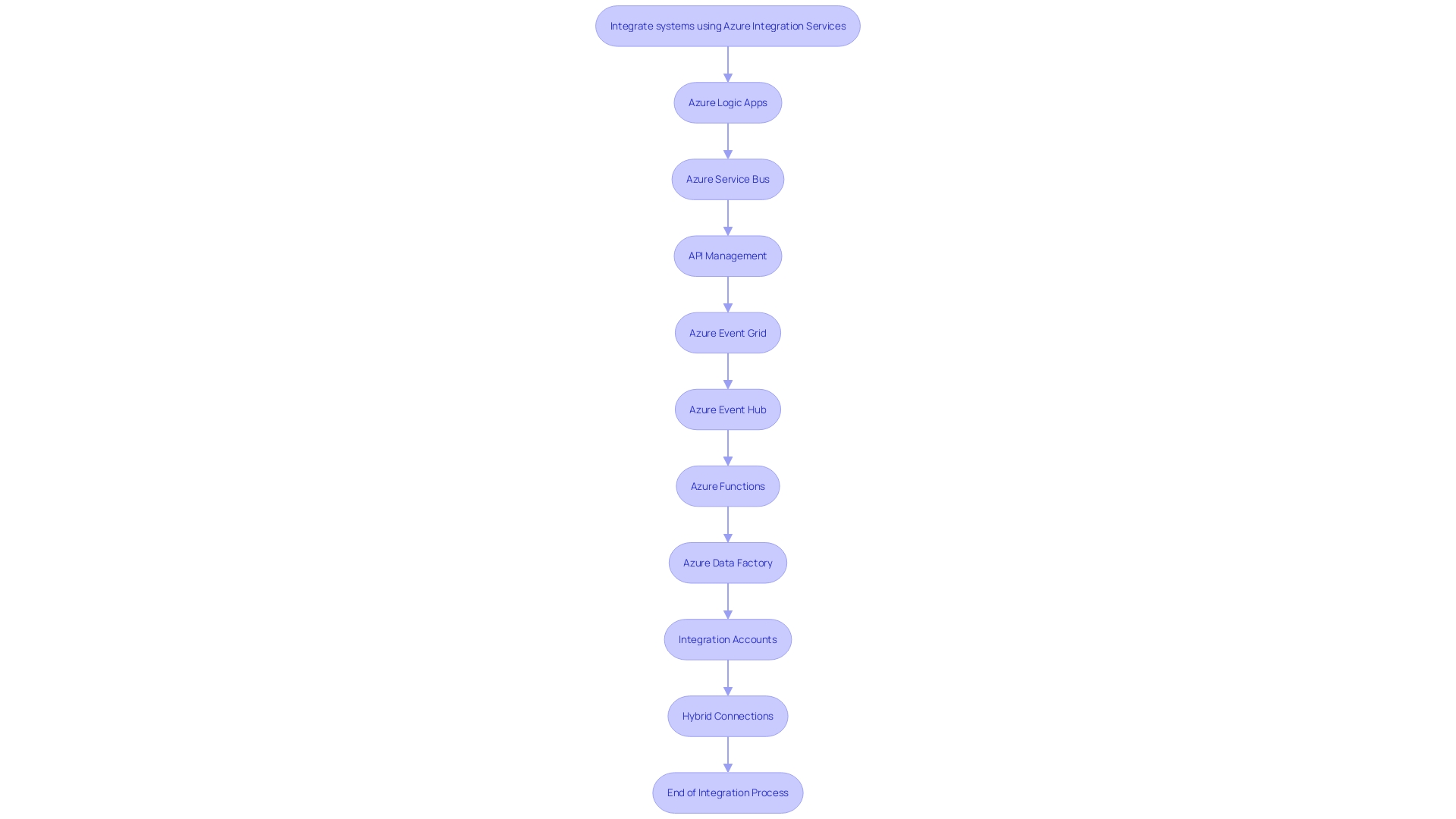
Azure Logic Apps
Azure Logic Apps serve as an integral tool in the landscape of cloud solutions, enabling businesses to automate workflows and streamline the integration of diverse systems and services. With its visual designer, Logic Apps simplifies the creation of intricate workflows, making the orchestration of business processes more accessible than ever. Developers can visually map out the steps and logic, driving efficiency and consistency across various applications.
Recent advancements in the field of Generative AI, especially as of November 2023, further augment the potential of Logic Apps. By incorporating AI, developers can now introduce multi-language voice support and advanced data access capabilities into their workflows. This integration exemplifies how Logic Apps can adapt to the evolving technological environment, providing cutting-edge tools for businesses to remain competitive.
The ease of use of Logic Apps extends to the adoption of templates for common scenarios, allowing quick deployment of prebuilt flows. Teams can collaborate effectively by assigning flow management and execution permissions within the organization. This flexibility is tailored to the business needs, with the extent of access governed by the type of license held.
Embracing the power of AI, Microsoft's introduction of Copilot assistance for form filling in model-driven Power Apps showcases a significant leap in user efficiency. This AI-driven feature generates intuitive field suggestions, reducing data entry efforts and elevating the accuracy of form completion.
In conclusion, Azure Logic Apps is at the forefront of integrating AI into business workflows, providing seamless connections between services and enabling a more intelligent, automated ecosystem. As the technology evolves, Logic Apps continues to offer innovative solutions that redefine business process automation.
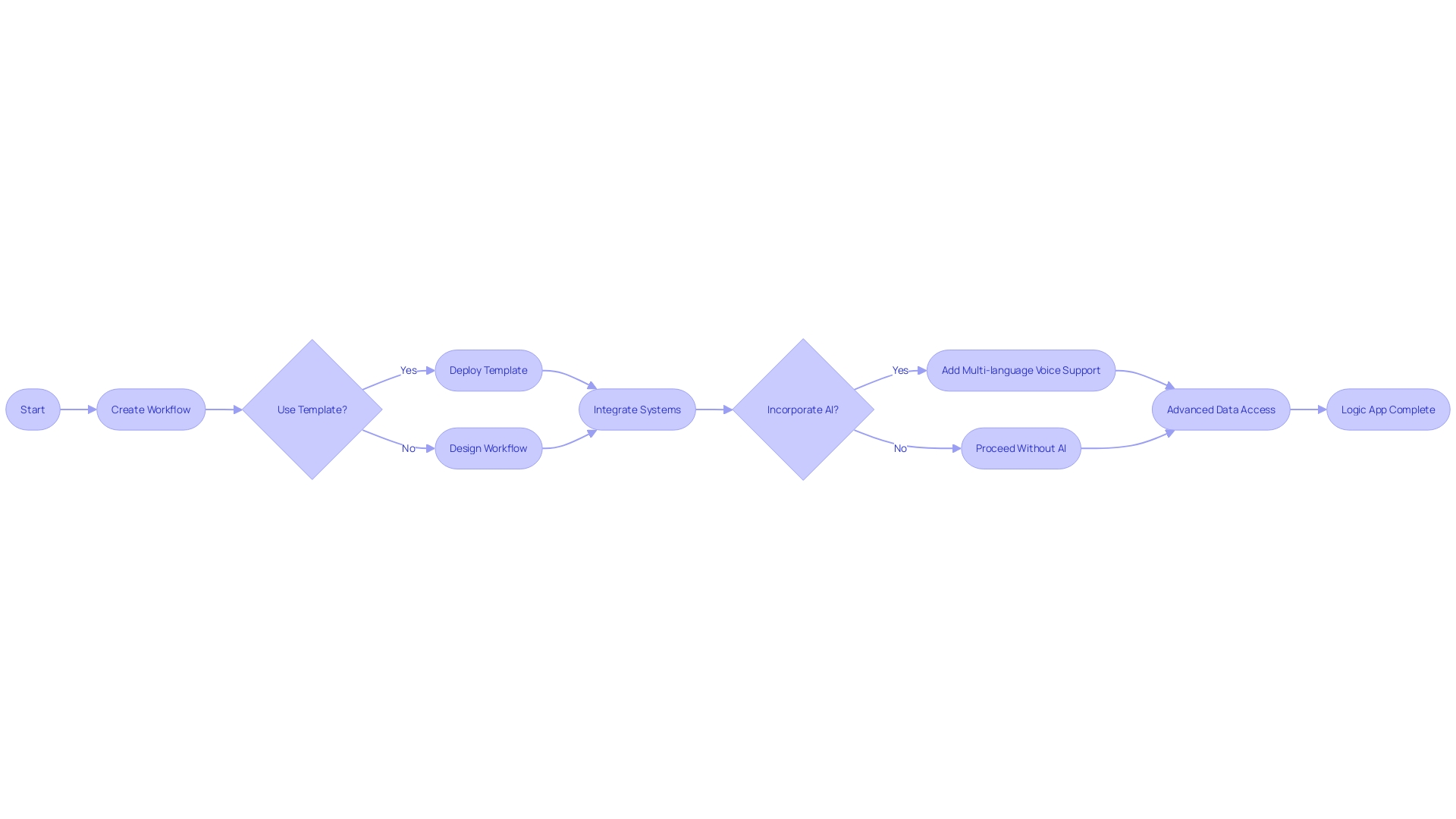
Azure Service Bus
Azure Service Bus excels in managing communication across dispersed systems with its robust messaging service. It adeptly supports various messaging patterns, including publish/subscribe and request/response. The service is designed to ensure reliable message delivery, even in complex distributed environments. With its adherence to the First In, First Out (FIFO) principle, Azure Service Bus guarantees that messages are processed in the exact order they are received, which is essential for maintaining the sequence of events in numerous computing and business operations.
By leveraging a message queue, Azure Service Bus enables asynchronous communication between applications. This queue, which operates on a FIFO basis, serves as a temporary hold for messages until they're ready to be received and acted upon by an application. Such a system is pivotal in scenarios that involve 1-to-N relationships between publishers and subscribers through topics, or when orchestrating workflows that demand strict message ordering or deferral.
Furthermore, the strategic design of Azure Service Bus mirrors the high-level planning required in software architecture, particularly within microservices. It aligns services with business goals and ensures that the system's architecture is both coherent and effective. This alignment is crucial for enabling enhanced collaboration among teams, reducing errors from manual data entries, and facilitating quicker, more informed decision-making for businesses.
Recent developments, like those announced at Microsoft Ignite 2023, highlight the ever-evolving landscape of technology where services like Azure Service Bus are integral. The integration of Azure Service Bus into enterprise systems simplifies and accelerates cloud migration, enhances security, and enables seamless connectivity across diverse assets and environments.
In today's fast-paced digital ecosystem, the strategic use of messaging services like Azure Service Bus is not just an option but a necessity. With its ability to handle massive amounts of data, as evidenced by Juniper Research's extensive datasets, it provides the clarity and depth of understanding required for effective decision-making in various sectors.
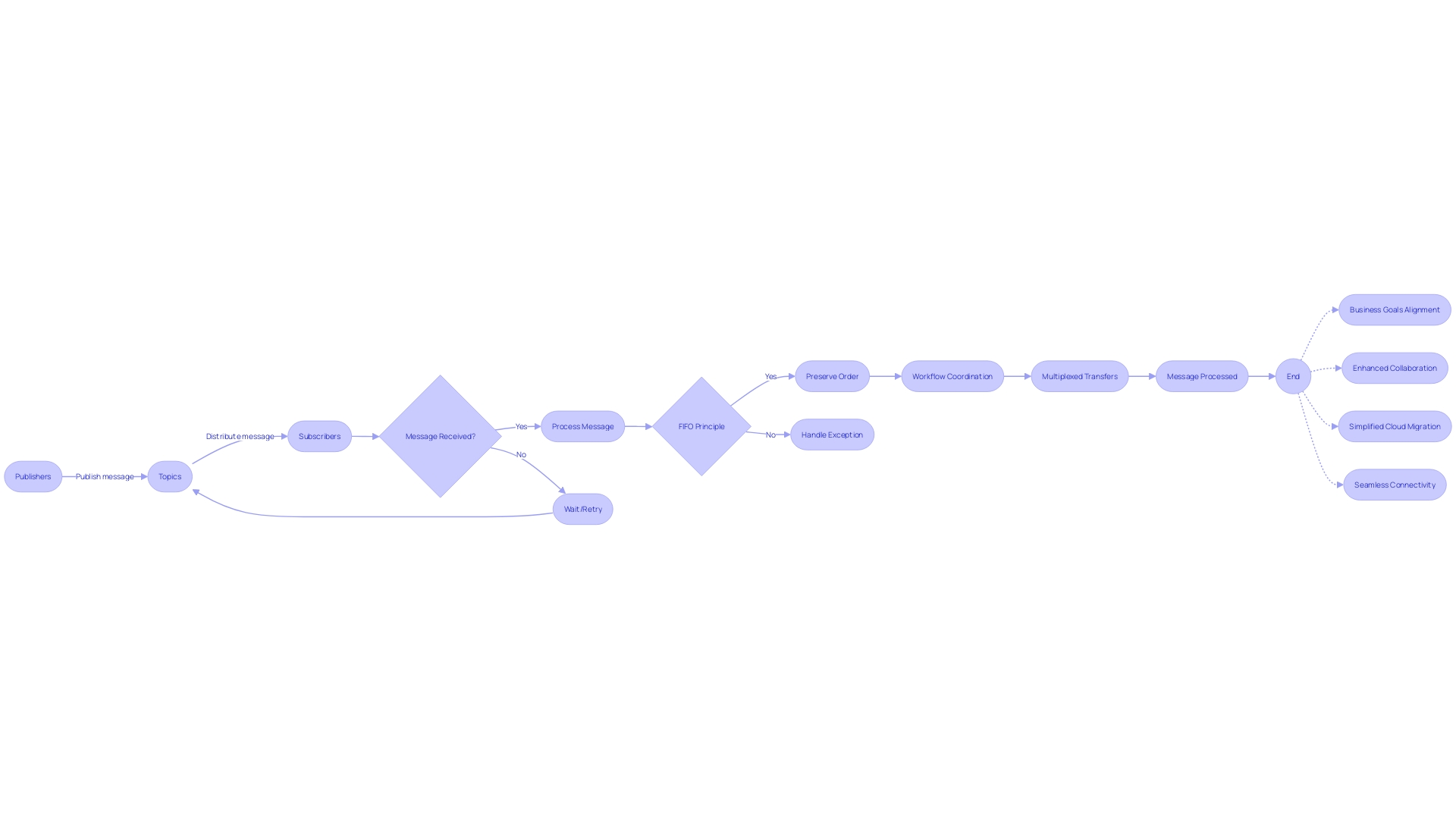
API Management
API Management has become an indispensable tool for companies that aim to extend their digital reach and harness the power of their data. It's a multifaceted platform that not only enables the secure and controlled exposure of APIs to external developers but also provides critical functionalities like authentication protocols, rate-limiting to prevent abuse, and comprehensive analytics that give valuable insights into API performance and usage.
Firms such as Finastra and Swiss Re leverage API Management to glean detailed usage data, informing them of which APIs are in high demand and which are underutilized. This data is crucial for understanding and adapting to market trends. For instance, Félix Grévy from Finastra highlighted the ability to monitor API usage trends with granularity, while Jürg Staub at Swiss Re pointed out the economic benefits of not having to heavily invest in database servers for high-transaction, low-margin business models.
In today's 'API Economy', APIs are more than just technical interfaces; they serve as vital conduits connecting businesses, processes, and data across the digital landscape. Boomi and other industry leaders advocate for the intelligent automation and integration of APIs, which has been a driving force behind the rise of mobile apps, social networks, and cloud computing. The strategic management of APIs aligns with this vision, as it allows organizations to efficiently launch new data products and services.
However, with the increasing centrality of APIs, security concerns have also escalated. A recent study revealed that 78% of cybersecurity teams have experienced an API-related security incident in the last year, underscoring the need for robust API management solutions that can enforce security standards and policies.
Moreover, the importance of API analytics cannot be overstated in this context. These analytics provide organizations with actionable insights, leading to better business decisions and enhanced user experiences. As the digital landscape continues to evolve, the role of API Management as a strategic asset will only grow more significant, providing companies with the tools necessary to navigate and thrive in the API-driven world.
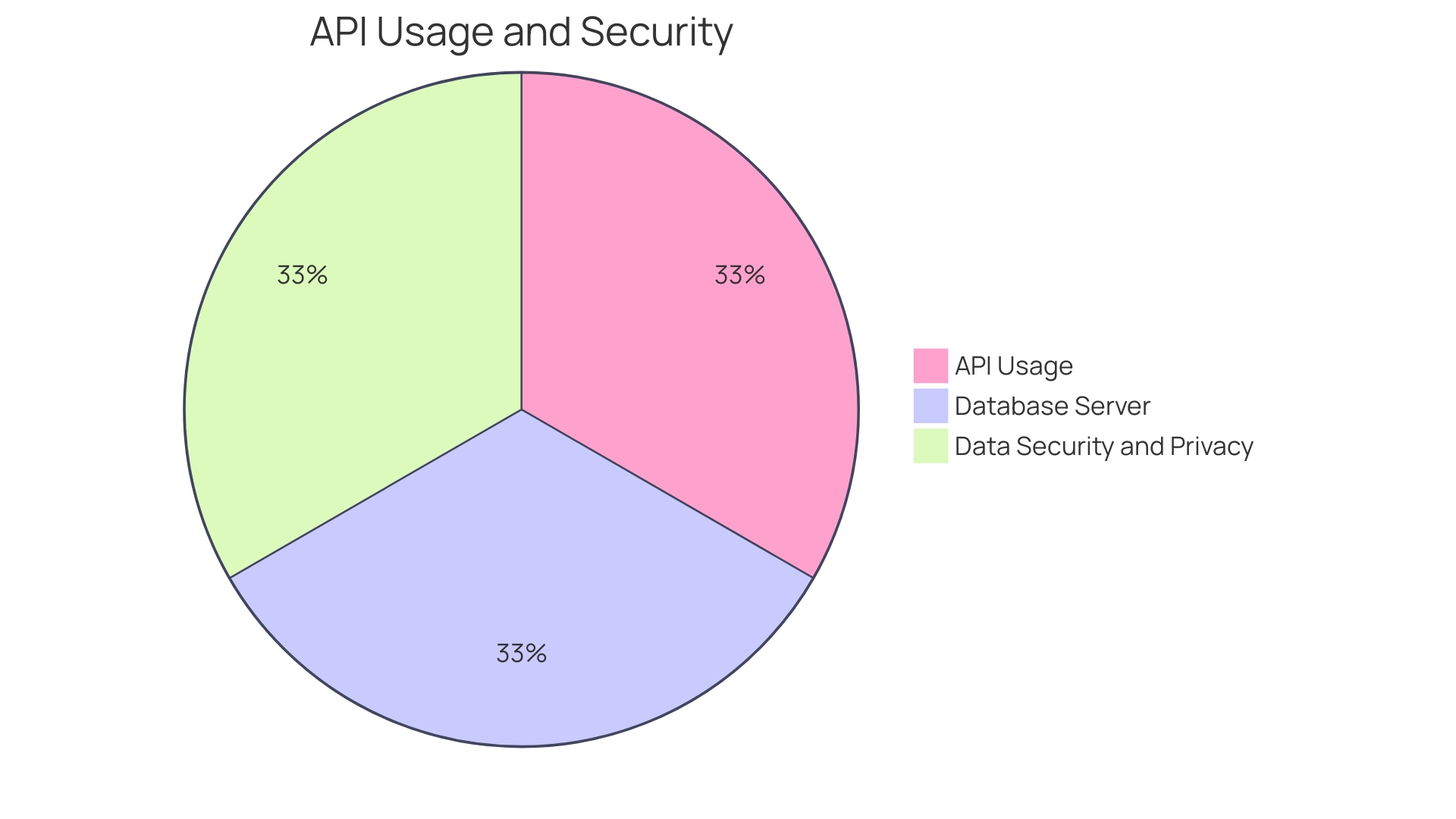
Azure Event Grid and Event Hub
Azure's Event Grid and Event Hub are pivotal in the orchestration of event-driven architectures, allowing businesses to seamlessly capture and process events from a myriad of sources, including applications, IoT devices, and various services. With the capability to process these events in real-time, these Azure services empower organizations to trigger immediate actions and refresh downstream systems effectively.
This real-time data processing is essential for maintaining data consistency and integrity, as it significantly diminishes the potential for errors and inconsistencies that might arise during manual data updating. Moreover, the real-time functionality fosters enhanced collaboration across different teams and systems, ensuring that information is shared and updated without delay.
Businesses leveraging Azure's event routing services can respond to market changes and customer needs with agility, enabling better decision-making. Microsoft's substantial investment in cybersecurity, with over 3,500 security experts and an annual budget exceeding $1 billion, underscores the reliability of Azure's infrastructure in managing event-driven solutions.
Azure's commitment to security and privacy is matched by its flexible pricing model, which includes a generous initial credit and a 'pay-as-you-go' system thereafter, ensuring that companies only pay for the services they consume beyond the free tier. Enterprises can initiate their journey with Azure's event services at no initial cost, benefiting from the managed stream processing engine that scales to meet workload demands, optimizing both costs and performance.
By integrating Event Grid and Event Hub into their systems, organizations unlock a proactive realm where services operate independently yet cohesively, enhancing system resilience and agility. This architectural approach is not just about technology; it's a strategic move towards a more dynamic and responsive business model, grounded in the principles of Event-Driven Architecture.
Azure Functions and Data Factory
Azure Functions is a powerful serverless computing service offered by Microsoft Azure, designed to process events with a fully managed compute platform. It provides an ideal environment for executing small pieces of code or functions without the need to manage infrastructure. This is particularly effective for tasks that are event-driven, where you can employ Azure Functions to run a script or piece of code in response to various triggers such as HTTP requests, database changes, queue messages, and more.
Azure Data Factory, on the other hand, is a managed data integration service that allows creation, scheduling, and orchestration of data workflows. It provides a visual interface to assist users in constructing data-driven workflows for orchestrating and automating data movement and data transformation. Azure Data Factory is a powerful tool for ETL (extract, transform, load) processes, enabling the integration of disparate data sources, and facilitating the smooth flow of data through various stages of processing to drive business insights.
These Azure services are not without their nuances, as illustrated by recent technological advancements. For instance, Microsoft's introduction of Copilot Studio at Microsoft Ignite 2023 is a testament to the evolving landscape of cloud services and the integration of AI into everyday tasks. This low-code tool allows for the customization of Microsoft Copilot, demonstrating the potential for serverless technologies to become even more intuitive and adaptive to user needs.
In practice, companies like Bosch have harnessed the power of serverless technologies to innovate in fields like sustainability. Bosch’s SOFC system, supported by a digital twin for visualizing and monitoring, exemplifies how serverless solutions can be pivotal in managing complex, data-intensive tasks efficiently.
Furthermore, the rise of generative AI has expanded the capabilities of serverless architectures. A chat application that utilizes Azure Functions can now access data and support multiple languages, showcasing the dynamic nature of serverless compute services to adapt to new developments such as AI and machine learning.
In conclusion, Azure Functions and Data Factory offer distinct benefits for businesses. Azure Functions are well-suited for smaller, independent tasks that react to events, while Azure Data Factory is ideal for complex data workflows. Both are integral components of a serverless architecture, enabling organizations to innovate and respond to the changing technological landscape without the overhead of managing infrastructure.
Integration Accounts and Hybrid Connections
A key component in ensuring effective and seamless hybrid integration is the use of Integration Accounts and Hybrid Connections. By leveraging Integration Accounts, organizations can establish a robust environment that is not only secure but also scalable, catering to the intricate needs of B2B communications and complex workflows. This infrastructure is crucial for managing the exchange of business documents, such as purchase orders and invoices, as well as other critical service-related data. It streamlines data-sharing processes, reduces the risk of manual errors, and enhances overall data exchange efficiency.
Hybrid Connections offer a vital bridge between on-premises systems and cloud-based services, negating the necessity for intricate network configurations. They provide the secure connectivity required to support real-time access and collaboration on documents stored across various platforms. For instance, a Salesforce professional services consultant can effortlessly access documents in SharePoint directly through the Salesforce interface, which fosters an organized and more productive workflow.
The recent acquisition of Software AG's enterprise integration platforms by IBM for 2.13 billion euros highlights the growing significance of advanced integration solutions in the market. Software Ag's platforms, including StreamSets and webMethods, offer capabilities such as application integration, API management, and data integration, which are essential for businesses looking to enhance their AI and hybrid cloud strategies.
Furthermore, the integration of Stripe as a unified payment service provider (PSP) demonstrates how seamless integration can touch multiple facets of a system, from payment processing to fraud analysis, all centered around improving the customer experience. As businesses continue to evolve and seek out integration solutions that can support a wide array of requirements, it's important to consider the breadth of current and future integration needs and ensure that the adopted platforms can handle the scale and types of integration necessary.
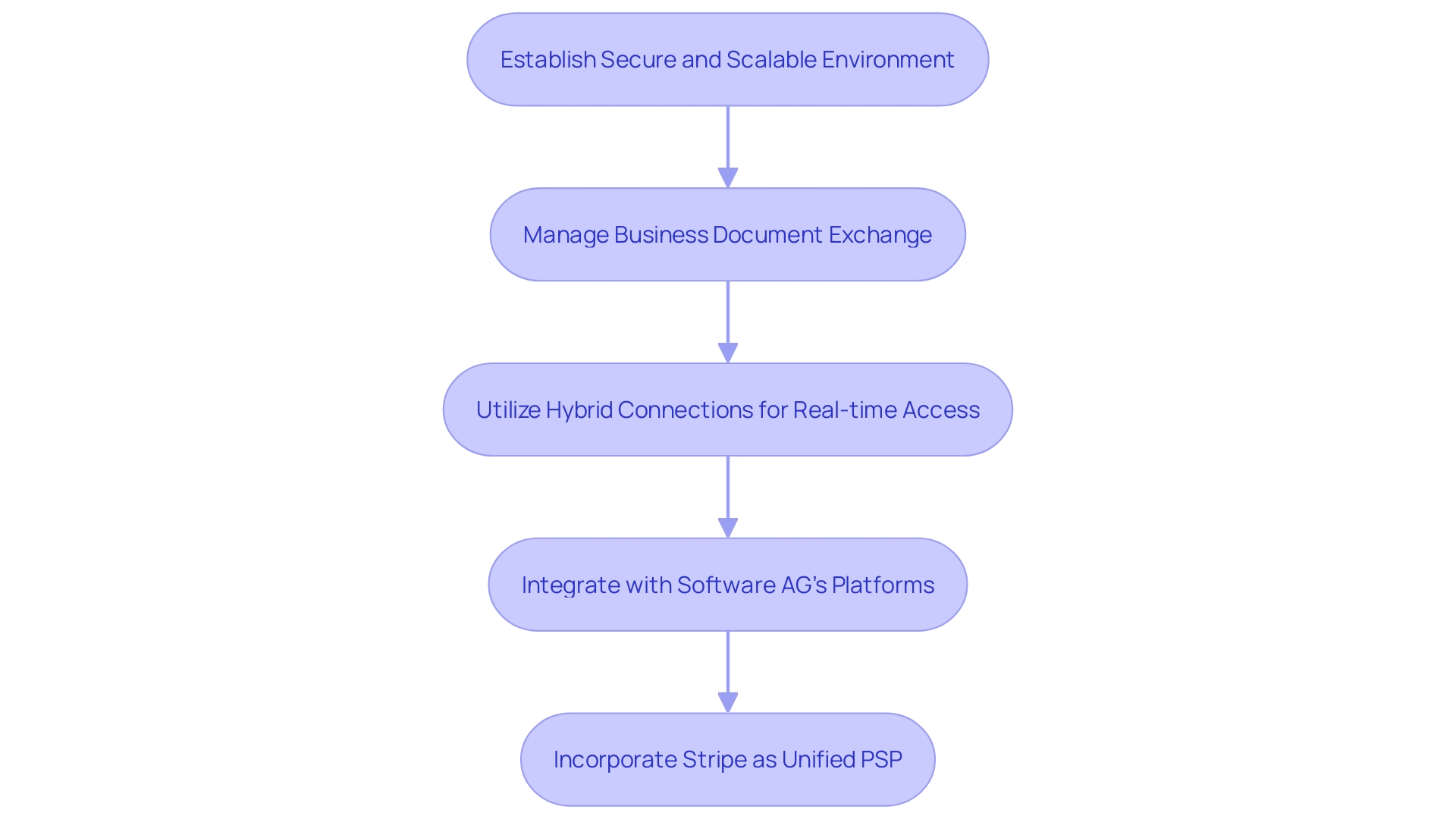
Use Cases and Scenarios for Azure Integration Services
Azure Integration Services are pivotal in modernizing and transforming business operations, meeting the demands of sophisticated integration landscapes. From unifying backend systems to facilitating event-driven architectures, Azure's suite of services seamlessly bridges different applications, ensuring data consistency and reducing manual errors. The synergy fostered by Azure's API strategies enhances collaboration across teams, enabling them to share and update information without friction, and empowers businesses to make prompt, informed decisions in response to dynamic market conditions and customer expectations. With the backing of industry leaders and the recognition by Gartner as a leader in the Integration Platform as a Service (iPaaS) space, Azure stands out for its robust capabilities. Companies like IFCO have leveraged Azure's services through partnerships with companies like Rackspace Technology to fully embrace cloud integration, underscoring its trusted platform status among customers. The global shift towards IoT and smart automation further underscores the significance of a reliable integration service like Azure, as it is projected to be instrumental in a market anticipated to reach $40 billion. Azure Integration Services deliver the scalability and adaptability necessary for businesses to thrive in a constantly evolving technological landscape.
Migrating from BizTalk Server to Azure Integration Services
Migrating from BizTalk Server to Azure Integration Services is a strategic move that can lead to enhanced scalability, flexibility, and cost savings. As businesses evolve, the integration of cloud-based solutions becomes imperative. Azure Integration Services offers a robust set of capabilities that can effectively replace legacy BizTalk Server functionalities, providing a pathway to modernization.
Azure Integration Services is recognized for its excellence in the field, as underscored by its position in the 2024 Gartner Magic Quadrant for Integration Platform as a Service. Microsoft's leadership in this area reflects its commitment to providing high-quality integration solutions that meet the dynamic needs of businesses.
For those considering the transition, it's important to understand that the migration process requires careful planning. Various tools and resources are available to facilitate this shift. For instance, the Azure Migrate: Discovery and assessment tool is specifically designed to assist with the discovery of Amazon Web Services (AWS) instances and their subsequent assessment for Azure migration.
To ensure a successful migration, it is recommended to engage with experts who have a proven track record in implementing integration scenarios. Consulting services, such as those provided by skilled professionals like Sandro Pereira, can offer valuable insights into complex technical considerations, drawing on experience with a range of technologies including AS2, EDI, RosettaNet, and SAP.
Microsoft's dedication to security is also a critical factor to consider during migration. With over 3,500 security experts focused on data protection and privacy, businesses can migrate with confidence, knowing that their data is safeguarded by industry-leading security measures.
In addition to expert guidance and security, the financial aspect of migration is also supported by Microsoft's flexible pricing model. New users can take advantage of a $200 credit for the first 30 days, with continued access to free services even after the credit is expended. This pay-as-you-go approach allows businesses to scale their integration services in line with their actual usage, optimizing costs and eliminating wasted resources.
The migration from BizTalk Server to Azure Integration Services represents not just a technical upgrade, but a strategic realignment towards a more agile, secure, and cost-effective integration infrastructure.
Best Practices and Architecture for Azure Integration Services
When constructing integration solutions with Azure Integration Services, it's critical to focus on architectural elements to ensure a system that is scalable, secure, fault-tolerant, and optimized for performance. Scalability is not just about handling growth; it's about enabling real-time data synchronization, which ensures data consistency and reduces manual errors, thus fostering enhanced collaboration across different systems. Security is paramount, as evidenced by Microsoft's employment of over 3,500 security experts solely dedicated to this domain, offering peace of mind that data is safeguarded at all times.
Fault tolerance is another cornerstone of Azure Integration Services, allowing businesses to maintain continuous operations even when unexpected system failures occur. This resilience is crucial as it supports better decision-making by providing access to real-time data, enabling businesses to swiftly respond to market shifts and customer demands. Moreover, with a fully managed stream processing engine, Azure supports dynamic scaling of workloads, and with no-charge cluster management, businesses can be more cost-effective, only paying for the compute and memory resources they actually use.
Monitoring and performance optimization are further enhanced by the tools and services Azure offers, which include free amounts of popular services and the flexibility of a pay-as-you-go model after initial credits are used. This financial model empowers businesses to build and scale applications without upfront costs.
The emphasis on these architectural aspects is supported by industry recognition, with Microsoft being named a Leader in the 2024 Gartner® Magic Quadrant™ for Integration Platform as a Service. This acknowledgment underpins the importance of following best practices when building robust and efficient integration solutions on Azure, ensuring that businesses are equipped with industry-endorsed tools and strategies for their technology investments.
Security and Scalability in Azure Integration Services
Azure Cloud Solutions, recognized for their robust security and scalability by industry experts such as Gartner, are essential for businesses aiming to integrate their systems seamlessly. With Azure Integration Services, you can rest assured that your data is protected through advanced security measures. These include rigorous authentication protocols, state-of-the-art encryption, and comprehensive access control mechanisms, ensuring that your data's confidentiality and integrity remain uncompromised.
In addition to security, Azure Integration Services are designed to adapt to your business's evolving needs. They offer scalability that effortlessly manages fluctuating workloads, providing you with the flexibility to expand as your business grows. This scalability is underpinned by Microsoft's substantial investment in cybersecurity, amounting to over $1 billion annually, and their team of over 3,500 security experts solely focused on safeguarding your data.
Validated by Gartner's Magic Quadrant for Integration Platform as a Service, Microsoft stands out as a leader, reflecting its commitment to delivering superior integration solutions that drive efficiency and strategic growth. Businesses benefit from enhanced collaboration, reduced errors, and better decision-making capabilities due to access to real-time data and seamless system integration.
With Azure's fully managed stream processing engine, businesses can scale their workloads up or down without incurring additional costs for cluster management, paying only for the compute and memory resources used. This economic efficiency is further supported by the offer of $200 credit for new users, allowing businesses to explore and utilize many popular services at no initial cost.
In conclusion, Azure Integration Services not only provide top-tier security and scalability but also contribute to the overall operational excellence of businesses by fostering enhanced collaboration, enabling informed decision-making, and ensuring economic efficiency.
Real-World Examples and Case Studies
Azure Integration Services have proven to be a pivotal resource for businesses seeking to streamline their operations and enhance decision-making capabilities through real-time data synchronization. A prime example of this is the collaboration between IFCO, a global provider of reusable packaging solutions, and Rackspace Technology, which led to a transformational shift in IFCO's IT infrastructure. Axel Bellermann, Head of Global Infrastructure and Cloud at IFCO, emphasized their need for a seasoned cloud partner to navigate their nascent cloud journey. By partnering with Rackspace, IFCO was able to draw on extensive experience and receive alternative, customer-centric strategies for their cloud deployment.
The value of such integrations is underscored by the 2024 Gartner® Magic Quadrant⢠for Integration Platform as a Service report, which highlights Microsoft as a Leader in the field. This recognition is not just a testament to their excellence but also emphasizes the importance of choosing a trusted provider for integration services. The report, which offers a comprehensive analysis of the integration platform landscape, is a valuable resource for organizations considering an investment in integration services.
Another compelling case study is Bosch's deployment of a solid oxide fuel cell (SOFC) system, supported by a digital twin. This innovative approach to energy production not only achieves a high electrical efficiency of 60 percent but also enables users to monitor and optimize performance, thereby enhancing sustainability efforts.
The integration of Azure services facilitates improved data consistency, enhanced collaboration, and informed decision-making. Real-time data synchronization ensures accuracy across systems, reducing manual errors and enabling businesses to respond swiftly to market shifts and customer needs. These examples serve not only as endorsements of Azure's capabilities but also as inspirations for organizations looking to harness the power of integration to achieve their strategic objectives.
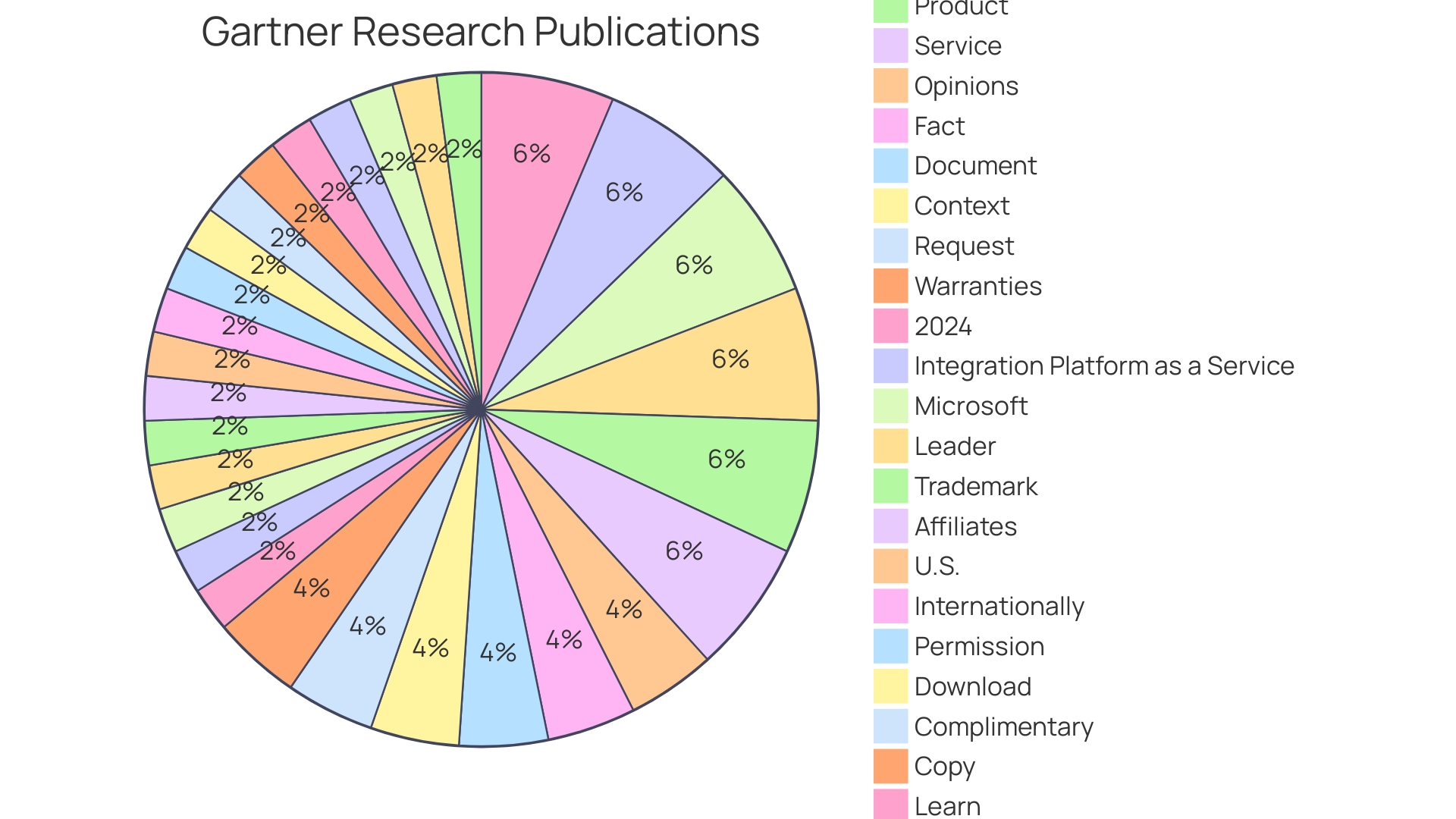
Conclusion
Azure Integration Services is a comprehensive solution for seamless integration, recognized as a leader in the Integration Platform as a Service sector. With core components like Azure Logic Apps, Azure Service Bus, API Management, Azure Event Grid and Event Hub, Azure Functions, Azure Data Factory, Integration Accounts, and Hybrid Connections, businesses can enhance data consistency, foster collaboration, and make informed decisions.
Migrating from BizTalk Server to Azure Integration Services offers enhanced scalability, flexibility, and cost savings. Expert guidance, security measures, and a flexible pricing model support a successful migration, creating a more agile, secure, and cost-effective integration infrastructure.
Azure Integration Services provide top-tier security and scalability, offering peace of mind and economic efficiency. The $200 credit for new users allows businesses to explore popular services at no initial cost, optimizing costs and resources.
In conclusion, Azure Integration Services empower businesses to achieve seamless integration, enhance data consistency, foster collaboration, and make informed decisions. With a comprehensive suite of tools, recognized industry leadership, and a commitment to security and scalability, Azure Integration Services are crucial for organizations aiming to thrive in a constantly evolving technological landscape.




